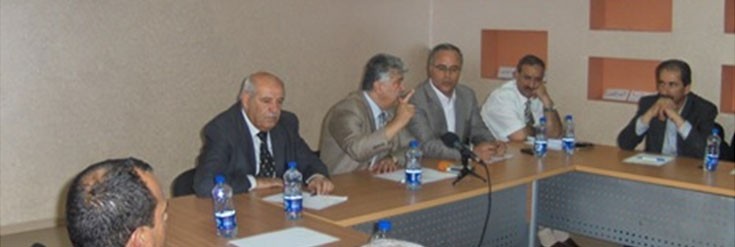
AWRAD’s SAWT program continues to respond to the needs of Palestinian society. As such it is organizing a number of activities and surveys to gauge the complexities surrounding the present economic crisis, the protests and the upcoming local elections. In addition to the roundtable meeting with PM Salam Fayyad on September 13, 2012 (http://awrad.org/etemplate.php?id=302&x=6), the following three follow-up roundtable meetings were organized.
Gaza Leaders Warn of Potential Upheaval
September 17, 2012
Leaders of political groups, civil society organizations and youth activists came together in Gaza city to discuss the results of AWRAD’s polling work. Twenty leaders and activists attended the roundtable meeting. Discussions were based on the results of AWRAD’s July 2012 poll revealing the deteriorating living conditions and the increasing concerns over violations of human rights and liberties. The participants warned that the protests in the West Bank might be followed with a more violent upheaval in Gaza if the current policies continued. Participants from all political orientations asserted that local elections must take place immediately in Gaza in an attempt to meet the urgent needs of the communities as illustrated in AWRAD’s polling. Some participants warned that conducting the local elections in the West Bank might reinforce the division and will be used as an excuse by Hamas to declare a separate political entity in Gaza. To others, local elections are only a means to divert attention from the more important legislative and presidential elections.
Hebron Leaders Point to Lack of Consultation and Marginalization
September 19, 2012
During a roundtable meeting organized by AWRAD and attended by Minister of Labor and representative of the Ministerial Cabinet– Dr. Ahmad Majdalani, leaders of the city of Hebron pointed to the centralization of government decision-making in view of the lack of consultations with community leaders. Many felt the Hebron region is excluded from the decision-making process and that decisions are imposed on citizens and businesses. They also pointed to the specific needs of the Hebron region. For example, some warned against the continuation of the division of the city to the benefit of the settler population and the resulting human rights violations. They also pointed to the destruction of the industrial base, which Hebron was historically well-known for, as a result of incoherent economic policies. It was also noted the registration for the local election in Hebron city is as low as 53%, with expectations for low turnout. The participants recommended public awareness campaigns and clean competition to encourage citizens to participate. The Minister of Labor explained government policies and future plans. Among the eighteen community leaders were representatives of the municipality, the governor’s office, and lists running for municipal election, local universities, youth and political groups. The leader of an all-women list participated as well.




Nablus: Municipal Elections are generally Perceived as a Way out of the Crisis
September 20, 2012
The participants in an AWRAD roundtable in Nablus emphasized the role of local council election in meeting needs of citizens as expressed in the latest protests. Minister of Social Affairs, Ms. Majeda Masri – representing the Ministerial Cabinet, carefully listened to the points of views of twenty vocal and influential local leaders, academics and youth. Dr. Hisham Awartani provided a brief on the nature of the current crisis and explained the many reasons behind it. The participants were divided between those who see that gradual changes must take place to amend the many wrongs that took place during the past two decades, while others were for radical change calling for the dissolution of the PA and making Israel take its responsibility for the continued occupation as per international law. While most participants viewed local elections as a democratic practice and a means to move forward on serving the needs of local communities, others viewed them as deficient and far from representative as the registration and turnout rates will prove to be low. Others warned that local elections might be followed by further violence. Young participants alerted decision-makers to the negative consequences of leaving the youth behind and outside of the development process.







